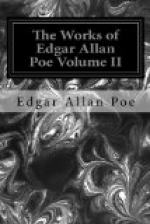I was not surprised, however, to perceive that he had long made up his mind on a point which had occasioned so much discussion to his friends. Nor was I greatly astonished at the nature of his decision. In regard to individual charities he had satisfied his conscience. In the possibility of any improvement, properly so called, being effected by man himself in the general condition of man, he had (I am sorry to confess it) little faith. Upon the whole, whether happily or unhappily, he was thrown back, in very great measure, upon self.
In the widest and noblest sense he was a poet. He comprehended, moreover, the true character, the august aims, the supreme majesty and dignity of the poetic sentiment. The fullest, if not the sole proper satisfaction of this sentiment he instinctively felt to lie in the creation of novel forms of beauty. Some peculiarities, either in his early education, or in the nature of his intellect, had tinged with what is termed materialism all his ethical speculations; and it was this bias, perhaps, which led him to believe that the most advantageous at least, if not the sole legitimate field for the poetic exercise, lies in the creation of novel moods of purely physical loveliness. Thus it happened he became neither musician nor poet — if we use this latter term in its every-day acceptation. Or it might have been that he neglected to become either, merely in pursuance of his idea that in contempt of ambition is to be found one of the essential principles of happiness on earth. Is it not indeed, possible that, while a high order of genius is necessarily ambitious, the highest is above that which is termed ambition? And may it not thus happen that many far greater than Milton have contentedly remained “mute and inglorious?” I believe that the world has never seen — and that, unless through some series of accidents goading the noblest order of mind into distasteful exertion, the world will never see — that full extent of triumphant execution, in the richer domains of art, of which the human nature is absolutely capable.
Ellison became neither musician nor poet; although no man lived more profoundly enamored of music and poetry. Under other circumstances than those which invested him, it is not impossible that he would have become a painter. Sculpture, although in its nature rigorously poetical was too limited in its extent and consequences, to have occupied, at any time, much of his attention. And I have now mentioned all the provinces in which the common understanding of the poetic sentiment has declared it capable of expatiating. But Ellison maintained that the richest, the truest, and most natural, if not altogether the most extensive province, had been unaccountably neglected. No definition had spoken of the landscape-gardener as of the poet; yet it seemed to my friend that the creation of the landscape-garden offered to the proper Muse the most magnificent of opportunities. Here,




